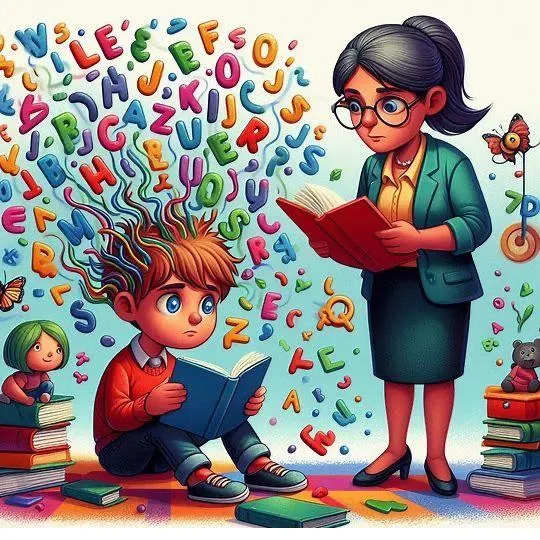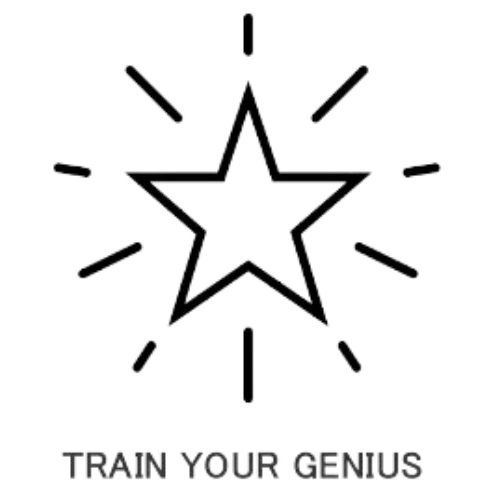DYSLEXIA

Overview
With dyslexia, you have a choice of two worlds - Disability or Genius. We will show you both worlds. You get to choose which world you want to live in.
Dyslexic Disability - Generally accepted view.
If you search AI, you will find results like this: "Dyslexia is a learning disability that affects reading and language processing. It is neurological in origin and often runs in families. People with dyslexia have difficulty with accurate and/or fluent word recognition and by poor spelling and decoding abilities. These challenges are not related to intelligence or lack of educational opportunities."
Here, the problem is the dyslexic, who has a defective brain. The solution is special phonics training, lots and lots of work, and a lifetime of struggle with poor abilities.
Dyslexic Genius Gift - A view pioneered by Ron Davis*
Some people, including dyslexics, have special talents in seeing the world, and a special way of processing information. Dyslexics are visual-spatial learners. They think in pictures, 3-dimensional, at very high speeds, faster than thought, non-linear - taking in information from many different angles at once.
It is right-brain, intuitive and creative... a genius superpower. This bypasses conscious awareness, and uses a powerful technique called disorientation.
Disorientation works brilliantly... until a person encounters reading and language processing, as taught in most schools. It is a simple mistake, to assume all people think and learn to read the same way. The way chosen - and imposed on all learners - has been left-brain, linear, auditory. In other words, the chosen method is slow down, linear, one-at-a-time, decode a written symbol into a sound, make that sound in your mind, translate it into a meaning... Slooowly...
Yikes... take brilliant children, and force them to slow their brain from a speed of 2000 images per second to a speed of 50. Make them switch their natural thinking method from pictures to sounds. Make them crawl at snails pace, to translate black marks on paper into sounds and then to meaning. Punish them, embarass them before their friends. Call them lazy. Tell them to try harder. Forbid them to think in their own natural way, which is to soar like a bird directly from pictures into meaning.
The result is confusion. It is disaster for visual-spatial learners like dyslexics and others. In any other context, we would call this forced adaptation 'abuse.' This type of abuse produces a learning disability, 'an unexpected learning difficulty, in reading and language processing. And it comes with a disastrous wounding of the soul. Many dyslexics come to believe they are slow or stupid. Problem behaviors often show up. The result is a lifetime of struggle and underperforming.
Good news! There is a better way! Keep reading, or skip ahead to the Getting Started section below...
'* Ron Davis, founder of Davis Dyslexia Organization International, author of The Gift of Dyslexia
Challenges
Typical Challenges: When learning is a mandatory auditory phonics-based approach, persons with dyslexia will face many challenges.
The Obvious...
Reading Difficulties: Struggling to read quickly and accurately, which can affect comprehension and enjoyment of reading.
Spelling Issues: Difficulty with spelling words correctly, often leading to frustration in writing tasks.
Phonological Processing: Trouble recognizing and manipulating the sounds in words, which is crucial for reading and spelling.
Writing Problems: Challenges in organizing thoughts on paper, leading to difficulties in written expression.
Slow Reading Speed: Taking longer to read and process written information, which can impact academic performance and daily tasks.
Not So Obvious...
Emotional Side Effects:
Lower self esteem, self doubt, stress, anxiety, fear of being found out, masking, sleep disturbance, performance below intelligence and capacity, poor relationship skills, limited opportunities.
Behavioral Issues:
A full range from silent withdrawal to defiant disturbance. Escape maneuvers include withdrawal into inner world, diverting attention, getting sick, jokester / clown antics, causing disturbance to be sent out of class or expelled, dropping out of school at minimum age.
Diagnosis
Unfortunately, it is behavioral disturbances that usually get the attention of teachers and parents. Don't delay! Behavior will usually get worse. And the emotional damage of untreated dyslexia is far worse than you can imagine.
Expert Help
Dyslexia is typically diagnosed through a combination of assessments, including reading tests, psychological evaluations, and a review of the individual’s educational history.
If a school is telling you that your child has a problem, listen. Believe them. Think back. Do you or any other family members have dyslexia? There is no shame in dyslexia itself. Only in hiding dyslexia.
Today, there are new solutions available, beyond anything we had years ago. Consider taking advantage of every resource they offer you. The key is to remain calm and positive. Dyslexia is a gift, not a sentence of doom for your family. YOU are in charge of the journey. YOU choose to follow a path of disability or genius gift.
As an adult dyslexic, you likely don't need an official diagnosis. If your life is affected by dyslexia, you can find out by taking an informal online quiz. Google 'online test for dyslexia.' You are the expert of your life. Does the quiz fit your life experience? Then decide - take on dyslexia solutions or don't bother. Remember, you have a choice of disability or genius gift.
When to Get a Diagnosis
Official diagnosis is needed, if you will seek help for your child's needs from a school system. Keep every record in a place where you can find it decades later. You may need to provide evidence into college age and beyond to adulthood.
In some states and countries there are now laws to protect the rights of people with 'learning disabilities.' To legally qualify for dyslexic help or accomodation, you would provide evidence from an expert. Accomodation and help could take the form of tutoring, specialized training, extra time when taking tests, or even financial help into adult years.
If you get an official diagnosis of dyslexia, you STILL have a choice on whether you will call it a disability or a gift, or both!
Good News!
Today, there are excellent solutions to the challenges of dyslexia. Once adults SEE there is a problem, steps can be immediately taken. Address the underlying problem early, and behavioral / emotional issues can drop away.
Early diagnosis and intervention are crucial, to prevent emotional wounding, and lifelong struggle.
Dyslexic children and adults are not to blame! There is nothing wrong with their way of thinking. It simply does not fit the typical learning method.
About children: Children cannot know what is going on - about dyslexia or other problems. They are completely dependent on the grown ups in their life. PLEASE be a grown up who is calm, accepting, and positive about the Gifts of Dyslexia.
If a child or grandchild has dyslexia, chances are that a parent or grandparent also has it. Maybe you. Congratulations! Dyslexia is a genius gift that runs in families generation after generation. Embrace it! Remember, this is a gift. YOU can be the family pioneer who openly embraces the Gift of Dyslexia and uses it to the fullest. No more silence. No more shame. Here we are, world!
You can't make dyslexia go away. It is a genetic gift of perception. You CAN openly admit there is a problem in learning. Dyslexics do NOT fit the current model of learning to read.
Face it. And take your power back.
Choose your approach - Dyslexic Disability
or Dyslexic Genius.
Love yourself. Educate yourself. And implement solutions.
When you are calm and model excellent problem solving behavior, children accept themselves, and do as you do.
Your mission, should you decide to accept it, is to BE a pioneer. Go forth, and Celebrate!
Getting Started
Various strategies can help individuals manage dyslexia. Here, we will divide these into two groups:
Dyslexic Disability and Dyslexic Genius
In each of the areas below, you may find excellence and caring professionals on both paths. I personally seek solutions and work with the best of both world. You are not limited to your local circumstances. With technology, you can connect with great minds around the world! Do adapt to your local circumstance. For example, you may require official diagnosis, or work with local school systems. No fear!
You can hold your mindset of Dyslexia as a Gift, and work side-by-side with experts who have spent a lifetime pouring their love and career into helping 'disabled dyslexics.' I find that unbreakable love is a bridge between worlds.
Specialized reading programs and interventions. The 'disability' approach focuses on left-brain skills using phonics and phonological awareness.
The 'gift' approach focuses on developing whole-brain mastery. This includes many tools, including focus, energy regulation (alone and with others), and skillfully moving between states of orientation (focused, logical thinking mode) and disorientation (creative, intuitive state) by choice.
Use of assistive technology, such as text-to-speech software. This area is growing rapidly, with ai and free or low-cost video learning. Video conferencing, video courses, interactive learning online, gamification (teaching through games that gradually increase in difficulty).
Accommodations in educational settings, like extra time on tests and assignments. This involves building excellent communication skills, and collaboration. Mindset and social skills are essential here. In your local area, you learn 'the system' and how to work with it.
Support from educators, therapists, and support groups. This is essential. The skill is to BE the leader of your own life. It is a journey. You become the person who holds the vision, designs goals, builds a team of trusted experts, family & friends. And you thrive together. I promise. This works.
RESOURCES
Disclosure
Some are affiliate links, which means, I might earn income. At no additional: cost to you. I am an Amazon Associate, and earn from Amazon qualifying purchases. Your support is greatly appreciated!
SITE USERS ACKNOWLEDGE: THIS SITE DOES NOT OFFER ANY MEDICAL, LEGAL, PSYCHOLOGICAL, THERAPEUTIC, RELIGIOUS, OR OTHER PROFESSIONAL ADVICE TO USERS. PLEASE SEEK THE ADVICE OF COUNSELING PROFESSIONALS (Physicians, Therapists, Clergy, Qualified Business Advisors, Lawyers, Accountants, etc) as appropriate, regarding the evaluation of any specific information, opinons, advice, or other content.
THIS SITE AND ALL CONTENT AND SERVICES ARE PROVIDED FOR INFORMATION PURPOSES ONLY AND ALL CONTENT AND SERVICES PROVIDED THROUGH IT ARE PROVIDED "AS IS" WITH NO WARRANTIES WHATSOEVER FOR INFORMATION, ADVICE, SERVICES OR GOODS RECEIVED THROUGH OR LINKS PROVIDED IN THE SITE.
Resource: Neurodiversity Call with Felicia Nagamatsu
In New Zealand: Rachel Barwell, Master Dyslexia https://masterdyslexia.co.nz/
Book (Genius Approach) - The Gift of Dyslexia by Ronald D. Davis and Eldon M. Braun
Book (Genius Approach) - The Gift of Learning by Ronald D. Davis and Eldon M. Braun
Dyslexia as a Genius Gift
A view pioneered by Ron Davis. The Davis Method Programs
Book (Disability Approach) - Overcoming Dyslexia by Shaywitz
Online Course (Disability Approach) - Coursera - Yale - Overcoming Dyslexia - Sally Shaywitz and Audrey G. Ratner
Book (Genius Approach) - Fish Don't Climb Trees: A Whole New Look at Dyslexia: Understanding and Overcoming the Challenges - Enjoying the Gift - by Sue Blyth Hall
Book (Education) - Why Tyrannosaurus But Not If? US/Can edition: The Dyslexic Blueprint for the Future of Education - Richard N. Whitehead
The Whole Dyslexic Society In Canada
© 2026 Train Your Genius
